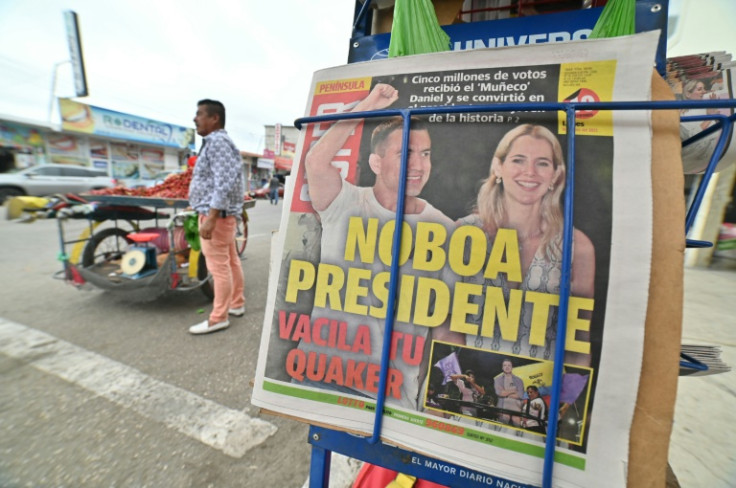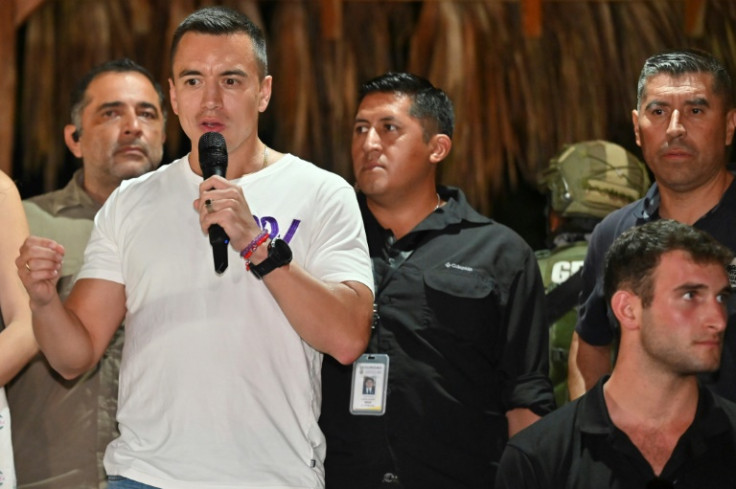Three Keys To Outsider Noboa's Rapid Rise To Ecuadoran Presidency

On Sunday, a 35-year-old millionnaire with next to no political experience became Ecuador's youngest-ever president-elect, entrusted with leading a country engulfed in a bloody drug gang war.
The businessman Daniel Noboa has only served two years in parliament, where his brand-new political alliance has only 13 lawmakers out of 137 -- but garnered a sufficient 52 percent of the vote over socialist Luisa Gonzalez.
In doing so, the US-educated banana empire heir dealt a heavy blow to the well-oiled political machine set up by socialist ex-president Rafael Correa, who hand-picked Gonzalez as the new face of his party.
Correa, who beat Noboa's father in the 2006 presidential election and served for 10 years, still holds much sway in Ecuadoran politics despite being exiled in Belgium to avoid serving a sentence at home for graft.
How did Noboa beat the odds?
The 35-year-old embodies a clamor for change from an electorate weary of the traditional battle between pro- and anti-Correa forces in the country, analysts say.
Ecuadorans wanted "a candidate who does not conform to traditional politics," SEK International University political scientist Santiago Cahuasqui told AFP.
Voters are also disgruntled with the government of Guillermo Lasso on whose watch the narco violence exploded, leaving at least 460 inmates dead in prisons, nearly a dozen politicians assassinated, and civilians cowering in fear.
Noboa polled dead-last among eight candidates who contested the first election round in August.
But he shot to prominence after appearing at a debate in a bullet-proof vest after the assassination of rival Fernando Villavicencio, who had been polling in second place but was killed days before the vote.
Casting himself as a candidate for change over continuity, Noboa said before the election that "people are excited, people are motivated, people want something new."
He was elected to a term of only 16 months, finishing the term of Lasso who called a snap election to avoid a possible impeachment over alleged embezzlement.
For analyst David Chavez, of the Central University in Quito, Noboa's success was also a sign of a "rightward shift" in the electorate.
Noboa, while describing himself as center-left, embraces neoliberal economic thinking and has support from the political right.
In the last election, in 2021, rightwing Lasso beat another Correa protege, former minister Andres Arauz, by a similar margin to Noboa's victory over Gonzalez.
The latest loss for "Correismo" -- to a complete political outsider -- amounted to a "significant defeat" for the socialist movement, said Cahuasqui.
It also appeared that the movement's strategy of relying on its most recognizable face may have reached its limit, added Chavez.
Correa, who used an oil bonanza to fund high government spending, was popular during his 2007-2017 administration and was twice elected in the first round -- something unknown in Ecuador.
Even if it seems the socialist nostalgia may be fading, Noboa will govern with a parliament dominated by pro-Correa forces and will likely face an uphill battle to push through any reforms.
Correismo is also in charge in the two biggest cities, Quito and Guayaquil.
The son of one of Ecuador's richest men, Noboa focused his electoral outreach on young people in a country battling a 27-percent poverty rate and high unemployment.
With a serious air, but tanned and sporty, he campaigned heavily on social media, promising to "bring back education to the youth" and create jobs.
"Because of his youth he is the best solution for everyone," Andres Garcia, a 29-year-old university student told AFP.
After crime and violence, which has seen Ecuador's murder rate quadruple in the four years to 2022, opinion polls showed that unemployment was voters' second-most pressing concern.
In remarks on election day, Noboa thanked his supporters for "believing that the youth can change a country."

© Copyright AFP 2024. All rights reserved.







